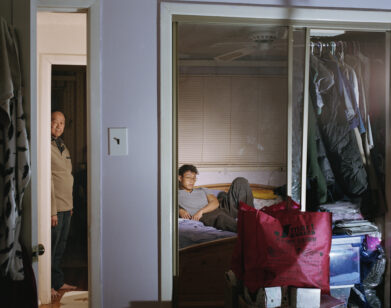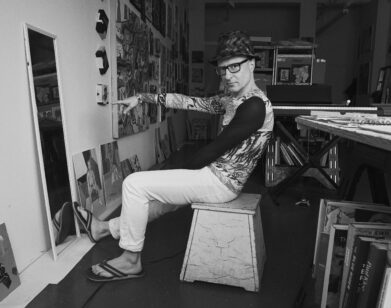lit
Torrey Peters’s Detransition, Baby! is an Homage to Divorced Women Everywhere

Though her characters teeter on the knife-edge, Torrey Peters is surefooted. Her debut novel, Detransition, Baby!, was scooped by former Grey’s Anatomy producers for TV adaptation mere weeks after its release. Her Instagram, which regularly features her astride Harleys and Yamaha MTs with the slow curve of open highway behind her, is overtaken by a slew of recent press. Her latest post has her book stacked atop recent novels by Raven Leilani and Brit Bennett, recognizing her as the first trans woman to be longlisted for the Women’s Prize for Fiction.
Peters hardly writes fiction for the sole sake of representation. She gleefully wades knee-deep into the swampy particulars of trans foibles, and remains unburdened by—as Baby! character Reese puts it—the “impeccable feminist politics that barely served her.” Reese herself is a flaming apostate. She’s bored of consent, which takes the punch out of her bedroom abuse, and “what it means to be a lady.” She disdains other trans girls who disdain tranny chasers, storing herself in one such chaser’s closet for months on end, where he’s hung a mirror for her to “spend hours staring at your own reflection, like the parakeet you are.”
Reese eventually escapes the closet and enters an unlikely triad with her detransitioned ex, Ames, and his boss-cum-girlfriend, Katrina. It’s a gender-troubled No Exit affair, anchored to the bedrock of the nuclear family: a baby. Here lies the core earnestness of Peters’s debut, in which her characters grieve a miscarriage, take stock of themselves, and make a new family in a thoroughly modern world. Peters answers my call from outside the Florida Keys, where she’ll soon be camping with her stepson.
———
CHARLIE JANELLE FREIBERG: You’ve attributed your love of fur to your mother, who grew up on a Chinchilla farm. Are you currently wearing your infamous fur coat?
TORREY PETERS: No. I’m actually in Florida, and there’s no use for fur in Florida. Although there are nutria here. And by the way, I try to only wear ethical fur, just so I don’t get any angry messages from readers.
FREIBERG: In her Goodreads review of your book, Roxane Gay says the title, Detransition, Baby!, is masterful. How’d you come up with it?
PETERS: It was nice of her to say that! The comma was contentious at first. There were people who weighed in against it. For me, it’s living on the knife-edge that is being a trans woman. If you could just fall off the edge towards a baby, you could have the legitimacy motherhood gives to womanhood. Or you could fall off and detransition, and however you feel inside, live with the advantage of being seen as a man. Me and my characters, we couldn’t do either. And so we exist on that knife-edge.
It’s also an extremely abbreviated description of the plot. It’s like, I’ll beat Hemingway by four words. “Here’s my shortest story, Hemingway.” But then, it’s also a pun! Like, “Hasta la vista, baby.” Or, “You’ve come a long way, baby.” Though the knife-edge came before the puns.
FREIBERG: You characterize Reese as both inside and outside of what’s normal. At one point she’s said to have “an evil facsimile of her dream life.” Would you say being trans offers her a bird’s eye view of the societal roles she, and the people around her, play?
PETERS: I go back and forth on this. There are times when I think that trans women have a certain wisdom on gender, and can see the ways it’s performed that cis people can’t. Then there are other times I think trans women are idiots who are just as confused about gender as everybody else, we’re just confused from a slightly different position. I’m confused over here, you’re confused over there, but we’re both confused.
FREIBERG: The Vox journalist who reviewed your book cites their friend saying they were “upset that the cis are going to read it.” Your book is earning plenty of publicity, and a broad readership, I’d say. What are the merits of having a general audience grapple with less than rosy depictions of an in-group?
PETERS: A lot of writers write for an audience that’s going to understand them. I had written along identity lines for these two novellas that I self-published. As I watched the way that those novellas were received in the world, I realized what I’m writing isn’t speaking for all trans women; it’s speaking for a narrow slice of them. I thought, “Am I really writing for this tiny niche of a tiny group? Actually, there’s many more people in the world who relate to me.”
You can speak universally by writing your specifics. That’s historically been the case with authors like Philip Roth writing about New Jersey Jews in revealing ways, then suddenly becoming a stand-in for all sorts of immigrant novels. And likewise for me, I’m a white trans woman living in Brooklyn. That’s my specificity to start talking about these universal experiences.
FREIBERG: Have you seen the TV adaptation of Philip Roth’s The Plot Against America? I think it was on HBO.
PETERS: I didn’t see that, but I read The Plot Against America when it came out, and I didn’t like it that much, although I am a Philip Roth fan. I really liked American Pastoral and Goodbye, Columbus and a bunch of his other work. Now that he’s dead, I can say, “It wasn’t my favorite, Philip.”
FREIBERG: Speaking of TV, you went rogue last month with your announcement that you’ve got a pilot in the works. What can we expect from Detransition, Baby!, the TV show?
PETERS: Well, I hope it’s funny. I hope it’s a trans entry in a long history of shows about single women in the city, starting with Mary Tyler Moore all the way through Sex and The City to Girls to Insecure.
FREIBERG: Reese, like many trans women, aspires to “live in a Lana Del Rey song.” She’s long been the muse for women seeking, as Sarah Nicole Prickett calls it in her Lana essay, “Amer-arcana.” What song would Reese choose to live in?
PETERS: “Blue Jeans.”
FREIBERG: Is it the same for you?
PETERS: I think at different points in my life, I would have chosen different Lana Del Rey songs. Early transition, it would have been something off of Ultraviolence. I think for a while I would’ve gone back to, maybe, “Ride.” My party era: “Florida Kilos.” Now I’m just a “Venice Bitch.”
FREIBERG: The New York Times has recommended your book for weekend reading—the same book in which Reese disavows The Times for having nothing good to say about transgender women. Trans coverage in media is obviously changing. Would you say it’s for the better, and how could it improve from here?
PETERS: I think it oscillates. In 2018, I knew a lot more trans women who were writing in staffer jobs in media companies than I do now. Vice used to have three trans women who were working there. Condé Nast and Them used to have a trans woman as the editor-in-chief. None of those people are working now, or maybe one of them is working. It’s not just about hiring a trans person when you’ve got a trans issue, it’s having a trans person on the editorial team to cover many types of stories. I do see more trans women doing freelance pieces, but I’d like to see more trans women in more staffer jobs, and on the editorial side.
FREIBERG: Reese jokes that the three transsexual occupations are computer programmer, aesthetician, and prostitute. If you had to add a fourth, what would it be?
PETERS: Some sort of nonprofit activist. Making money off of being trans itself is another way trans women survive. I don’t think it’s always cynical, either. I know a lot of trans people who work at Callen-Lorde or do nonprofit organizing, where their job is to write grants about being trans for foundations that are eager to give money to trans people.
FREIBERG: You often cast trans women in your fiction as each other’s harshest critics, exposing the resentment, envy, and even repulsion that trans women might feel towards each other. What perks are there to shirking mainstream narratives for uncovering inconvenient truths?
PETERS: What makes shame work is that it consists of things that can’t be named. People keep quiet about it, and it just sort of lurks. In those first two novellas, there was a power in my naming things. Talking about sissy fetishes or the ways trans women sometimes fight amongst each other is scary because you want to present a unified, political front, when in fact, behind it, there’s all these fractures. But naming it is a way to move through it. If you pretend that’s not the case, well, then you remain fractured under the surface forever.
In my first novella, The Masker, there’s a young character who’s repelled by the way an older trans woman looks and behaves. If I were to write about a real trans woman, I would never write that stuff. I would never write, “I’m repelled by how you look and behave.” It’d be too cruel. But that feeling still exists in the world, and so, if you want real honesty, fiction is the place to excavate what’s otherwise too painful.
FREIBERG: Your novel is ostensibly about transitioning and detransitioning characters, but it’s also very familial, touching on marriage, child-rearing, and domestic life.
PETERS: I used to feel ashamed to want a family, because I’d read lots of queer theory that says, “The family is the problem.” I think it’s okay to want one. I’m saying to trans women, “You deserve to have a family.” I don’t know what it looks like, but I know it’s crucial.
If cis people start thinking about families in a way that includes trans people, it doesn’t just make things good for trans people, it’s better for them too. If you look at a lot of cis marriages and cis families, it’s not working. You could read essays on heteropessimism and other ideas that say as much. Half the shows on TV are about cis women who are unhappy with heterosexuality and family as it exists. So, I’m just positing for them, consider how devising new families could make you truly happy.
FREIBERG: I was touched by the dedication to divorced women. It felt like an olive branch.
PETERS: Divorced cis women are my role models. We’re very similar. In my mid-thirties, the excitement of transition is over, and that drama has passed. Now, I have to figure out what to do with the rest of my life. How do I live? How do I find meaning? How do I figure out how to care about people and not be bitter, not see myself as a victim, not go back to some illusory idea of a Prince Charming saving me? The people who know how to do that are divorced women. Once I understood that, TERF arguments online, or questions of like, “Am I a woman or not?” fell away. The actual practice of living for me is the same as for them. I felt that not in an intellectual way, but in my body and my heart. In my soul is this way of being a woman that I see all around me. Look what these other women are giving me. When I dedicated it to them, it wasn’t an olive branch, it’s the most classic form of dedication. It’s an homage.






